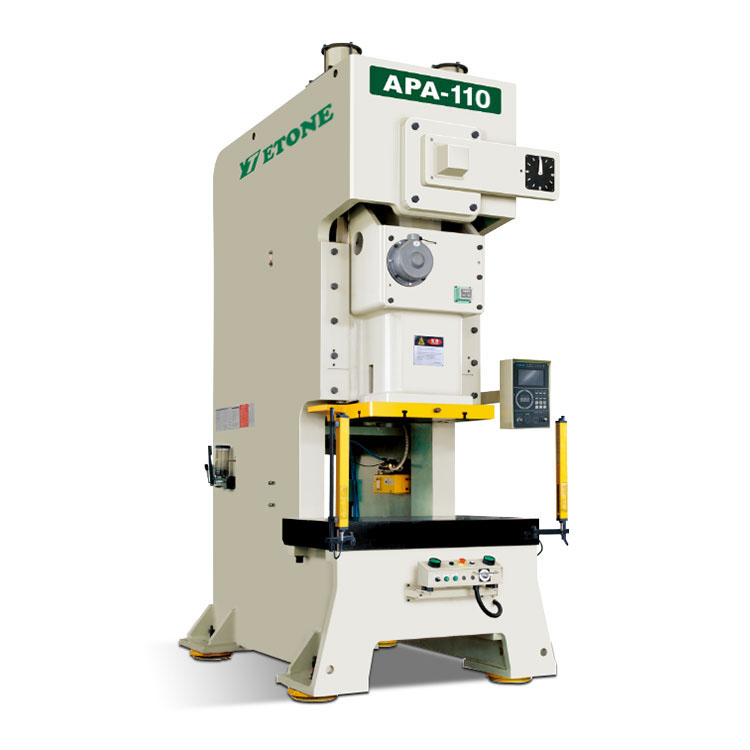When choosing a mechanical press, you need to consider several factors to ensure that the selected equipment is suitable for your production needs and is efficient, safe and economical. Here are a few key factors to pay attention to when choosing a mechanical press:
1. Pressure and tonnage requirements
Tonnage selection: The first factor in choosing a press is its working tonnage, which is the maximum pressure that the press can apply. Choose the appropriate tonnage based on your process requirements. Generally speaking, too much or too little tonnage will affect production efficiency and cost.
Calculation formula: The required pressure is usually related to the material thickness, area and processing method of the stamping part. The required pressure can be calculated based on the production process to ensure that the appropriate machine is selected.
2. Type of processed material
Material hardness: Different materials have different hardness, and harder materials (such as high-strength steel) require greater pressure. When choosing, you need to understand the type of material you will be processing.
Material thickness: The thickness of the material will directly affect the required pressure. Thicker materials require more pressure for forming.
3. Working stroke and opening height
Stroke length: The working stroke of the mechanical press (that is, the distance the punch moves up and down) determines the processing depth it can complete. Longer strokes are suitable for processes such as deep drawing and deep punching.
Opening height: The opening height refers to the maximum distance between the platen and the worktable, which determines the height of the workpiece to be processed. Make sure that the opening height of the machine can accommodate the workpiece to be processed.
4. Stamping speed
Stamping frequency: According to the needs of the production line, choose a mechanical press with a suitable stamping frequency. If you need efficient production, it is more suitable to choose a high-speed press. For production with lower output, you can choose equipment with normal speed.
5. Accuracy and stability
Processing accuracy: When choosing a mechanical press, its processing accuracy must be considered. The accuracy requirements of the equipment directly affect the quality of production, especially for the manufacture of precision parts, the higher the accuracy, the better.
Stability: The stability of the equipment affects the reliability of the production process, ensuring that it can operate stably and is not prone to failure during long-term use.
6. Control system of the equipment
CNC system (CNC): Modern mechanical presses are usually equipped with CNC systems, which can achieve higher automation and precision control. Choosing a press with a CNC system will improve production efficiency and flexibility.
Automation degree: Choose equipment with different degrees of automation according to needs. Fully automatic equipment is suitable for mass production, while semi-automatic or manual equipment is suitable for small batch production.
7. Brand and after-sales service
Brand reputation: It is usually more secure to choose a press machine from a well-known brand, because these brands usually provide high-quality products and perfect after-sales service.
After-sales support: Mechanical presses are long-term equipment, so after-sales service is very important. Choose manufacturers that provide technical support, equipment repair and maintenance services to ensure the long-term stable operation of the equipment.
8. Safety
Safety protection: There are certain risks in the operation of mechanical presses, so safety protection measures must be taken. For example, equipped with safety covers, emergency stop buttons, guardrails, etc. to prevent operators from being injured.
Compliance with standards: Ensure that the press complies with relevant safety standards and regulations, especially in some high-risk working environments, safety is particularly important.
9. Energy efficiency and environmental protection
Energy consumption: Choosing an energy-efficient mechanical press can reduce energy consumption in the production process and reduce production costs.
Noise and vibration: The noise and vibration of mechanical presses have a certain impact on the operating environment and employee health. Choosing equipment with low noise and low vibration can improve the comfort of the working environment.
10. Price and budget
Budget considerations: The prices of mechanical presses vary greatly, and high-end equipment usually has more functions and higher prices. Choose the right equipment according to your own budget and needs to avoid excessive investment and financial pressure.
Cost-effectiveness: When choosing, try to find the best balance between performance and price, ensure that the selected equipment can meet production needs, and purchase within the budget.
Summary:When choosing a mechanical press, first clarify the process requirements of production, including factors such as pressure, material type, precision, speed, etc., and then comprehensively consider the brand, price, after-sales service and safety of the equipment. Through careful selection, you can ensure that the purchased equipment can meet production needs while improving work efficiency and production quality.


